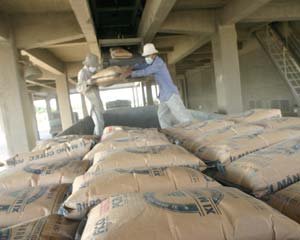VietNamNet Bridge – Vietnamese cement manufacturers have been doing a great
deal of harm to each other when they try to lower the export prices to scramble
for clients.

In order to boost exports, a lot of cement manufacturers have to accept to slash
the export prices. Vietnam’s cement export prices are now 10 percent on average
lower than the prices offered by other regional exporters.
The fact that Vietnamese enterprises accept to export clinker and cement at low
prices has given foreign importers a reason to force the prices down further.
Since some cement manufacturers have slashed the export prices, others have to
follow the move, or they would not be able to sell products. As a result, cement
enterprises all have reported bad business results.
According to the Ministry of Construction, in the first six months of 2012,
Vietnam exported 3.2 million tons of cement and clinker, much lower than the
targeted export volume of 7-8 million tons this year.
Cement manufacturers still believe that the modest export volume still should be
seen as an encouraging result, because the exports have helped a lot in reducing
the inventories, while only 23.8 million tons cement were consumed domestically
in the last six months.
Nevertheless, the Ministry of Construction has pointed out that lowering the
export prices must not be seen as a right track for cement manufacturers to
follow, because this cannot bring profits to them and does not ensure the
sustainable growth. While the input material prices all have increased sharply
(the coal price has increased by 170 percent, electricity by 19 percent and oil
by 40 percent), it is really unreasonable to slash the export prices.
Nguyen Van Thien, Chair of the Vietnam Cement Association VNCA, has pointed out
that the cement manufacturers’ problems are not only the common ones existing in
the national economy, but also the lack of cooperation among them.
Thien said that in principle, the cooperation would help push up the production
and the sales, both in the domestic and foreign markets. However, they still
cannot have a common voice for mutual benefits.
VNCA, in an effort to establish the close cooperation among cement
manufacturers, has gathered the managers of the cement plants to discuss the
cooperation methods to ease the current difficulties.
VNCA has suggested that the cement plants in the northern, central and southern
regions should appoint an enterprise, which is powerful and prestigious enough,
to act as the leader in the market and step by step, organize an institutional
market.
The current export prices of 36 dollars per ton of clinker and 50 dollars per
ton of cement would make enterprises take profit, because the prices cannot
cover the expenses. Therefore, VNCA believes that enterprises should join forces
to raise the FOB (free on board) clinker price to 40 dollars per ton at minimum.
An executive of Fico Tay Ninh Cement Plant also said that the current export
prices would not bring the turnover high enough for enterprises “to live.”
However, Deputy Director of Vicem But Son cement company Ngo Duc Luu, has warned
that it would be impossible to call for the enterprises’ cooperation in pricing
cement products, except the subsidiaries of the Vietnam Cement Corporation.
Source: TBKTVN
- © Copyright of Vietnamnet Global.
- Tel: 024 3772 7988 Fax: (024) 37722734
- Email: evnn@vietnamnet.vn